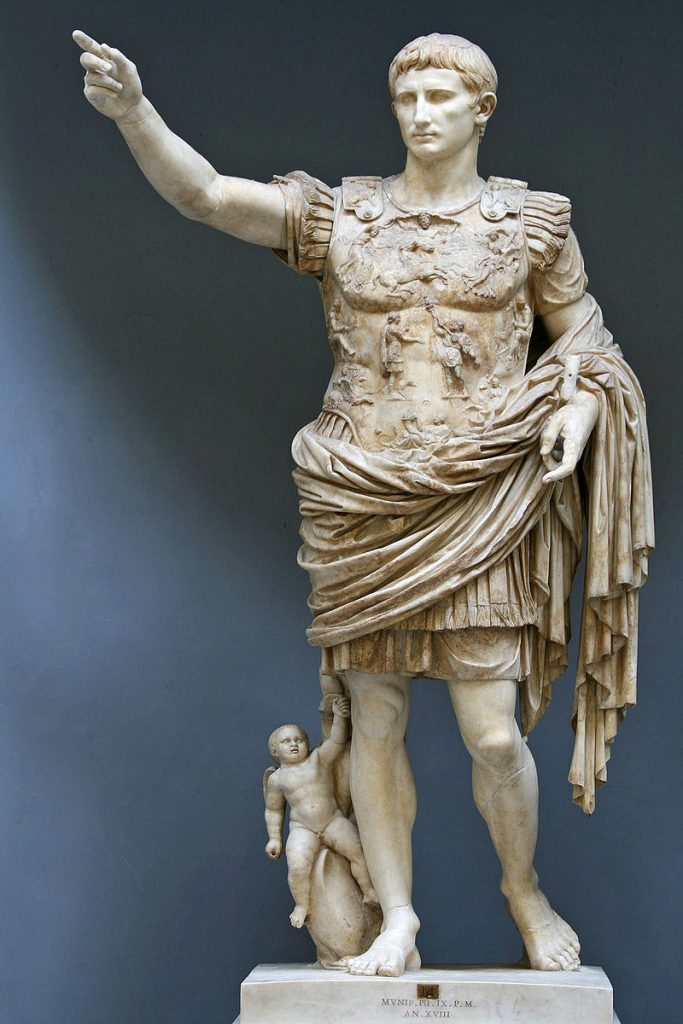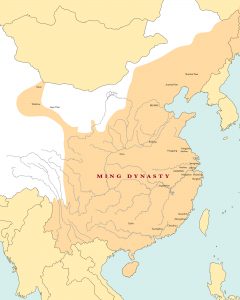Forty-five years of unopposed rule seems an unlikely feat for any ruler in Roman history. After a civil war that lasted thirteen years, treachery, and chaos, Rome finally had an emperor it could count on. Rome’s first emperor was born as Gaius Octavius in 63 B.C.E. His family was unlike any other in Rome at the time; they were humble and kind to say the least.1 After the late dictator of the fallen Republic, Julius Caesar, adopted and named Octavian his heir in 45 B.C.E., he was thenceforth renamed Gaius Julius Caesar. His name was changed again in 27 B.C.E. to Augustus Caesar by the Senate.2 It was with this name Augustus was remembered for, and he stayed in power for decades. Augustus stayed in power for so long because he was intelligent, refused extravagant titles, was recognized as god-like, and single handedly restored Roman architecture and government.

While trying to consolidate his power in Rome after Caesar’s assassination, Augustus looked to Marc Antony, then in Egypt, as an ally, and formed the Second Triumvirate with him and Marcus Aemilius Lepidus. Their shared power inevitably led to differences, but Augustus stayed level-headed, and intelligently went around Antony’s and Lepidus’s authority. Together, they defeated the last of the Republic forces and Sextus Pompeius (son of Pompey the Great).3 Soon after, Augustus and Marc Antony split up the Roman Empire and co-ruled, until Augustus caught wind that Antony was planning on creating an independent monarchy in Asia Minor. Seeing an upper hand in this situation, Augustus exposed Marc Antony’s intentions to the Senate. This led to Rome seeing Antony’s actions as an act of war, and the Senate did not hesitate to declare war on Antony and Cleopatra in 32 B.C.E. This act ultimately led to the demise of Egypt’s last Ptolemaic rulers, since Antony and Cleopatra committed suicide before being captured by Roman soldiers. Without Augustus’s intelligence, Rome might have had another civil war on its hands, had Antony been able to take control of Rome. The defeat of Antony gave Augustus complete power over Rome and its people.
Fearing another civil war, Augustus steered clear of naming himself as dictator or sole leader; instead, he took upon himself the role of consul or tribune. For thirteen consecutive terms, Augustus remained as head of the Roman Empire and refused extravagant titles. He was often called princeps, or “first citizen.” This name delivered the image Augustus wanted to uphold. His identification with the common people of Rome is what made his rule accepted in Roman society. Even when Augustus was given supreme power, he wanted to be called princeps and continued to defer to the Senate to keep the peace.4
Many of Augustus’s subjects saw him as god-like. Halley’s Comet was said to have appeared during the beginning of his reign, and Augustus claimed it was Julius Caesar’s spirit going to heaven. Rumor had it in Rome that if this were true, then Caesar was a god, which would make Augustus the son of a god.5 In addition to Augustus’s public persona, he hesitated to remove any who were unfit to serve beneath him. He routinely removed and exiled from his Empire any who threatened his legacy. He was swift and just in the actions he took with any who violated Roman law or morals. For example, after making adultery illegal in Rome, Augustus is said to have sent his daughter into exile for adulteries she committed.6
Make Rome Great Again would have been a just campaign slogan for Augustus. He did exactly that by restoring Rome’s architecture and government. In the autobiography by Augustus called, “Res Gastae Divi Augusti,” which translates as the deeds of the divine Augustus, Augustus tells of his good deeds to Rome throughout his reign as Emperor. In this autobiography, Augustus claims to have restored “eighty-two temples of the gods in the city by the authority of the senate.”7 It is said that Augustus found Rome as a city of brick and made it a city of marble. He also kept the Pax Romana, or Roman peace, alive and well throughout his rule. This led to an improved economy and caused the arts to flourish. Some lasting artists from Augustus’s rule include Horace, Ovid, Livy, and Vergil. The Senate was grateful for all of Augustus’s achievements for Rome, and they gave him the title of pater patriae—father of his country in 2 B.C.E.8
Through his ambition and expertise, Augustus single-handedly made Rome one of the greatest empires of all time. The amount of time Augustus ruled was unparalleled in the history of Rome. Augustus successfully kept his power with his military intelligence, refusing extravagant titles, being seen as god-like by Rome, and making Rome peaceful and prosperous.
- Patricia Southern, Augustus (Roman Imperial Biographies) (New York: Routledge, 2013), 6. ↵
- Salem Press Biographical Encyclopedia, September 2015, s.v. “Caesar Augustus,” by Michael Witkoski. ↵
- Salem Press Biographical Encyclopedia, September 2015, s.v. “Caesar Augustus,” by Michael Witkoski. ↵
- Ancient History Encyclopedia, August 2010, s.v. “Augustus,” by Joshua J. Mark. ↵
- Nandini Pandey, “Caesar’s Comet, the Julian Star, and the Invention of Augustus,” Transactions of the American Philological Association, vol. 143, no. 2 (2013): 407. ↵
- Salem Press Biographical Encyclopedia, September 2015, s.v. “Caesar Augustus,” by Michael Witkoski. ↵
- Thomas Bushnell, The Deeds of the Divine Augustus, transl. Thomas Bushnell (Cambridge, Mass: Internet Classics Archive, 1996), 20. ↵
- Salem Press Biographical Encyclopedia, September 2015, s.v. “Caesar Augustus,” by Michael Witkoski. ↵



43 comments
Samuel Sanchez
Amazing Article. I never knew how Augustus was able to retain his power in Rome. Insightful achievements that the author made apparent showed how “god-like” he really was. I never knew that he did not want to be seen as a superior figure but it was a good idea since he wanted to avoid another civil war. This was a great read!
Luke Trevino
This article was extremely insightful! Before this article I hardly knew anything of Augustus! It is amazing how he ruled that many years without letting the power go to his head! He was an overall great and smart leader and what truly made him great was that though he achieved all this greatness, he was still humble. Overall really good article and great structure to it!
Alexis Soto
I ponder who achieved more success Julius Caesar or Augustus? When I first learned of Augustus and his role in the Roman Empire I was surprised to not have learned of him much sooner. Although I had read of Augustus this was a great reading that gave a respectable view of Augustus and his rule of Rome. He accomplished a great deal before and after becoming the first Emperor of Rome.
Mario De Leon
Interesting article on who Augustus was and how he saved Rome. The article did a good job emphasizing that he was an intelligent ruler. Augustus’ intelligence is evident when the author mentions that he had to go around the authority of Antony and Lepidus. I knew Augustus was a great ruler but I did not know the story of how he took down Antony and saved Rome from another war.
Daniel Bailey
Its interesting to learn how Augustus restored the Roman Empire without facing the fear of an uprising against him. He truly shows the characteristic of a good leader by showing control, modesty, and fearlessness. He kept the idea of the republic in my opinion to symbolize that his leadership is about leading his people to greatness and not just to feel like a superior who cant connect with his people. That is why he was called the “first citizen” and by showing control he proved to his people he is the rightful heir to Julius Caesar. Good job in demonstrating the time line in how Augustus has regained the structure and power of the Roman Empire.
Aaron Jaramillo
This is a very well done article! I had limited knowlege of Augustus Cesar before reading your article and found it interesting and impressive that he remained in power for forty-five years. I was completely impressed by all of his accomplishments. Great detail and great job.
Nicolas McKay
Amazing article. I remember reading in class about how quickly emperors were killed and new ones took their place, so to hear that Augustus’ reign lasted as long as t did is incredible. Its almost humorous that a large part of his long reign was achieved through not taking on grand names. Rome truly would ot have become the mighty empire that it did without him.
Erik Rodriguez
Awesome article! I did not know he didn’t like to be seen as a superior figure! That is just crazy to me, considering he had so much influence and power within his realm. Not to mention, he was also very humble and intelligent. It’s quite amazing to know that their has been people with true compassion and humility no matter the situation or image. Augustus certainly represented himself sincerely and has left a legacy never to be forgotten.
SUPER informative and a pleasure to read. Keep up the good work!
Ivanna
Wow! Before reading your article, I had little to no prior knowledge of Augustus Cesar. It was extremely intriguing to find about his extensive reign over The Roman Empire. As well as learning about his humbleness while in power. How it didn’t matter that he was already in power for 5 terms or 10 terms he refused to accept fancy titles that made him superior. Another thing that I found interesting was how loyal and trusting the citizens of Rome were to Augustus. Overall, it was an extremely well-written article!
Awesome job!
Mehmet Samuk
I loved your introduction !! The first two sentences hooked me up to the article. I have always been interested in Rome Emperors and their tragedic lives. You illustrated Augustus’s life and his legacy very well. He was an intelligent experienced and humble emperor. Good Job !!